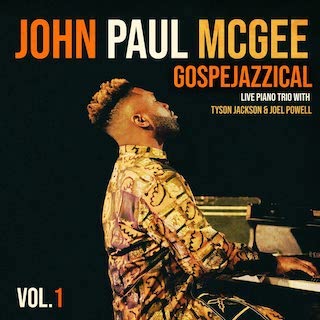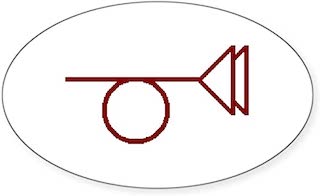
John Paul McGee: Leaving listeners uplifted, even restored…
By David McGee
 GOSPEJAZZICAL, VOL. 1 (LIVE)
GOSPEJAZZICAL, VOL. 1 (LIVE)
John Paul McGee
Jazz Urbane
Well, here’s something you don’t encounter very often, at least on disc: a gospel, classical and jazz hybrid. And a mighty fine hybrid it is, both in its original songs by pianist John Paul McGee (no relation) and stirring, even surprising interpretations of ever-relevant warhorses such as “Amazing Grace” and “The Lord Will Make a Way” along with contemporary gospel landmarks such as Benjamin Winans’s “Heaven.”
John Paul McGee was all of four years old when, as legend has it, he sat down at a piano and began playing songs—hymns and standards alike—as if he had written them. Recognizing their son’s preternatural gift, the McGee parents encouraged the lad in his musical pursuits, leading ultimately to where he is now, with a career resume of accompanying gospel and mainstream artists alike (including Patti Labelle and the Clark Sisters), performing Stateside and well beyond our shores before making the leap to a solo career in 2014 with a holiday album, A Christmas With John Paul. His latest, Gospejazzical, Vol. 1 (Live), finds him fronting a trio featuring bassist Joel Powell and drummer Tyson Jackson, with baritone saxophonist Michael Walton making two memorable appearances, and vocalists Wendi Henderson-Wyatt, Zebulon Ellis, Kenneth Lowe and, notably, Amber Bullock adding additional emotional edge with uniformly soulful performances. Released on October 28, Gospejazzical, Vol. 1 (Live) doesn’t even pretend to be a holiday album, but the joy and expressiveness emanating from these musicians’ approach to every moment leaves a listener uplifted, even restored, in a way common to the best holiday outpourings.

‘Amazing Grace,’ John Paul McGee with bassist Joel Powell and drummer Tyson Jackson from Gospejazzical, Vol. 1
The players being jazz artists should tell you some chances will be taken, and so it is. “Amazing Grace,” for instance, finds McGee, oh so melodically, breaking down the melody line and exploring hidden nuances and tones, even tempos, as Powell fashions measured bass lines and Jackson sets down a textured percussive backdrop with rolls, cymbal splashes and hi-hat thumps, all in service to McGee’s continuing exploration in tandem with Walton’s warm baritone establishing the soundscape and then taking off on atmospheric flights away from the original melody before ceding the platform back to McGee’s ever-bluesier sorties (bassist Powell also gets a crowd pleasing moment of his own here). At the end, the whole thing explodes into a wild, seemingly free-form outburst with McGee and Walton busting out all over. It’s a beautiful setup for the piano musings, alternately more introspective and soaring, to follow in “The Fount,” a pulsating, life affirming reworking by McGee and Larry Wilson of the Christian hymn dating to 1758 and better known as “Come Thou Fount of Every Blessing.”

‘The Lord Will Make a Way,’ John Paul McGee with Joel Powell (bass), Tyson Jackson (drums) and Kenneth Lowe (vocals), from Gospejazzical, Vol. 1
The record’s first vocal performance, “Here’s to Life,” a 1992 tune co-written by Artie Butler (music) and Phyllis Molinary (lyrics), announces itself with a flurry of dramatic strings (arranged by Roy Cotton), which return in feathery fashion about midway through, slipping in behind a measured, impassioned vocal by Wendi Henderson-Wyatt. Singing of resilience in the face of hardship, Henderson-Wyatt offers a voice uncannily reminiscent of young Barbra Streisand’s, in texture, in phrasing, even in the well-timed upper register flights Babs perfected back in her Bon Soir days. Zebulon Ellis comes aboard late in the game with an impassioned deep gospel account of backsliding leading to redemption in Kenneth Shelton’s “The Book of Life” (“trying hard to walk upright/I know my name’s in the book of life”) that unfolds into a celebratory strut as the trio, at Ellis’s urging, kicks out the jams, McGee romping across the keys and pounding muscular chords over a walking bass and solid drumming before Ellis returns for a shouting, triumphant, tour de force of vocal finesse ranging from low rumble to wailing high register. On the standard “The Lord Will Make a Way,” Kenneth Lowe offers mighty, mighty testimony in the fiery style of the Rev. Julius Cheeks, righteous and aflame with biblical passion as McGee supports him with straight ahead gospel piano worthy of Mildred Falls, the better to underscore Lowe’s message to “take courage, take courage somehow.”

‘A City Called Heaven,’ John Paul McGee with Joel Powell (bass), Tyson Jackson (drums) and Amber Bullock (vocals), from Gospejazzical, Vol. 1

‘The Fount,’ life affirming reworking by McGee and Larry Wilson of the Christian hymn dating to 1758 and known as ‘Come Thou Fount of Every Blessing. John Paul McGee with Joel Powell (bass), Tyson Jackson (drums), from Gospejazzical, Vol. 1
When her turn comes, Amber Bullock takes it home with formidable vocal displays on two numbers, back-to-back, starting with the traditional Negro spiritual, “A City Called Heaven,” a plea for salvation in which her deliberate, stately approach embodies the soul-deep weariness and resulting challenge of getting over in a performance giving every indication of being informed and hard-earned in its wisdom. This is followed by the Benjamin Winans-Brian Keith Thomas gem, “Heaven,” a pop-ish expression of desire for “a place where love will never cease,” with Bullock’s melismatic flourishes supported by the trio’s equally energetic workout making an emphatic instrumental point supporting the singer’s dramatic testifying.
Along the way McGee and trio offer several purely instrumental expressions of faith and spirituality, as in, for instance, the studio recordings of Alan Pasqua’s ruminative “Highway 14” and Barry Harris’s lively Guaraldi-like “When We All Get to Heaven,” both pieces being outstanding showcases for McGee’s fluid, conversational approach and his rhythm section’s spot-on shadowing. In the end Emmett G. Price III nails the artistry on display here to a T in his liner notes when he observes: “This unique approach is more than a feel. It is a sound. It is a feel. A spiritual fluidity that offers a sanctified move of fresh utterances of life force.”



